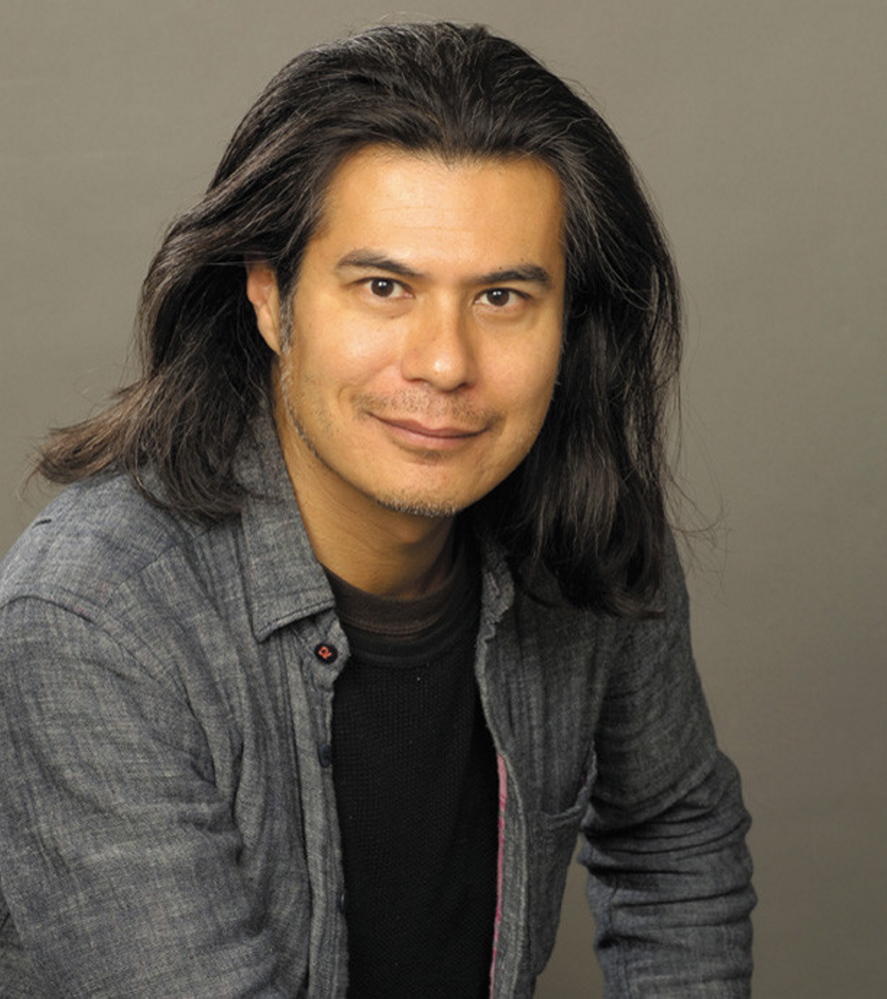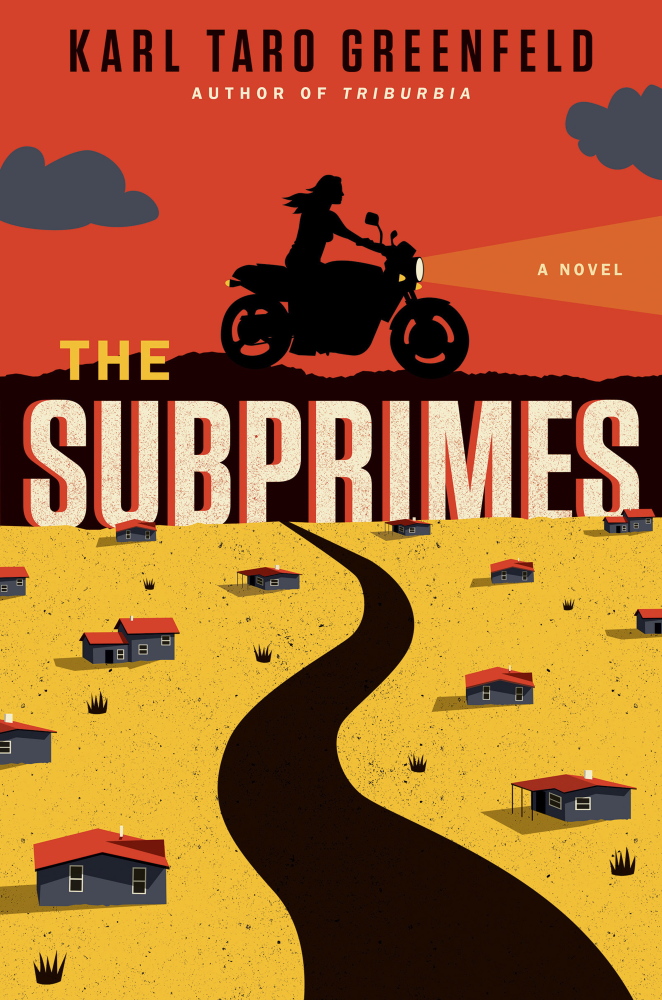In Karl Taro Greenfeld’s novel “The Subprimes,” the division between rich and poor has opened into a chasm that’s funnier than it should be. New freeways bring the 1 percent to their homes in Malibu while the underclasses – everyone whose credit is subprime – use the hopelessly slow 405 for the three-hour drive between Westwood and LAX. Social programs have been privatized: Public housing consists of a weeklong voucher to Motel 6. Meanwhile, the wealthy Pepper sisters and their Christian ally, Pastor Roger, drill for America’s last drop of oil. Into this comes Richie Schwab, a semi-employed journalist with a habit of making bad decisions, and Sargam, a motorcycle-riding heroine who helps homeless families create a settlement in an abandoned development in the Nevada desert. Greenfeld, who lives in Pacific Palisades with his family, spoke to us about the book by phone.
Q: Pacific Palisades is a pretty ritzy neighborhood. Does that make you a prime?
A: Pacific Palisades is the town I grew up in. I don’t see myself as a prime because I was grandfathered in. My childhood friends, some of their dads were auto mechanics; they had blue-collar professions. That isn’t the demographic of Pacific Palisades anymore. I lived through that change. My daughter now goes to Pacific Palisades High School where I went. I’m seeing firsthand the changes in almost every strata in this community, and that is profound. That’s one of the reasons I made fun of it in “The Subprimes.”
Q: When did you start the book?
A: I started in 2011, very aware of the credit crisis, this wave of foreclosures, these ghost towns that had sprung up throughout the Southwest, and then finished it in the context of disappointment with Barack Obama and disappointment that Occupy didn’t amount to more than it did.
Q: In your book, Sargam becomes a leader of the underclass. Is that wishful thinking? If you could rewrite history, would you give Occupy a hero?
A: I began to wonder what would a truly transformative person, or hero, be like in this day in age. We had this great, multiracial promise-giver in Obama, but our hopes were a bit misplaced. He’s certainly a very successful product of our meritocracy, but he hasn’t really been that transformative figure. I began to step back and wonder, what would that person really look like? If that person turned up, would she even be recognizable in the context of our meritocracy right now? We expect our transformative figures to have gone to Harvard law. To have been straight-A students. To have decent credit scores. I began to think: No, a truly transformative figure emerges as someone who doesn’t have any of the markings of success or virtue as usually recognized by our society. Like Jesus Christ. That character I had in mind way before doing the book. What would a messiah look like, and how would she be received?
Then, during the 2012 Republican debates, I thought: What if you take the economic policies these guys seem to support – eliminating the IRS, ending public education, the EPA, the FDA, privatizing Social Security – and see what America would look like.
Q: That sounds very serious, but the book makes the awfulness funny.
A: I knew there were funny riffs in it, but I saw the overall arc as kind of tragic. What I’m saying, what I’m predicting (fictionally, at least), is going to happen to America if we continue on this road of aggressive private-sector domination of economic policy. Yes, I think it reads funny, it certainly has a lot of narrative drive, but I think there’s a larger, sadder note in there. It surprised me when I gave the book to my editor and was told it’s like a comedy.
Q: Did you have any models for the ultra-rich, ultra-conservative Pepper sisters?
A: I started with the pastor, and then I thought, he himself is an ideologue but he doesn’t have economic clout. Then I created these two sisters who may resemble a very prominent pair of formerly libertarian and now deeply Republican petroleum tycoons.
Q: How about Richie Schwab, who, like you, is a writer living in Pacific Palisades?
A: One of the things that happens when you’re writing a novel set in the near future is you also start to speculate, “What would happen to me? Who would I be, and what would happen to my family?” Obviously the family is different. … But I made the decision to do an exaggerated near-future version of my life and how messed-up that might be. There are similarities. My day job has been, ironically, to be a business writer for a lot of publications. I spent a lot of time covering some of our greatest and most accoladed capitalists. I thought it would be interesting to have a business writer gradually coming to terms with the fact that he’s essentially a propagandist for a system that is crushing people.
Q: Is “The Subprimes” then a kind of penance, a novel written on the side of those who were crushed?
A: I don’t think writing a novel can have enough impact in the world these days to be considered penance. To be considered off-setting of whatever damage I might have done. Again, I’ve never been a rabid free-market cheerleader myself; I wrote for the Nation for years and so forth. But I think, one’s fiction is always somewhat a response to one’s own life.
Q: Is fiction, satire, a good place for social commentary?
A: I don’t know. That’s what I’m doing in “The Subprimes,” and I can’t answer whether it’s the right approach or not. Certainly, most good fiction has an element of social commentary inherent to it. Fiction’s durability, in part, is because it offers social commentary.
The book I’m overtly admiring (in “The Subprimes”) is “The Grapes of Wrath,” which for me was always if not the great American novel, a great American novel, because of how it “entertains,” was a page turner, was beautifully written but also clearly had a political agenda that I also admired.
Q: Although “The Subprimes” presents a broken society, it also reveals people pooling resources to form a more equitable community. One character calls it “people helping people,” another tries to use the word “socialism” and gets shut down.
A: If you look at the total victory capitalism won over what had passed for communism, it means the entire far left of the political spectrum has become a bad word. Everything from progressivism to the far left, all the way to communism, has been vilified. To call someone a Socialist is such a bad rap because of the total victory capitalism won.
Q: Do you see things happening in real life now, say, environmental crises and massive privatization, and think, “No, no, I was just making that up?”
A: I worry real life will eclipse this book very quickly. Whenever you’re writing about the near future, you’re always going to get some things wrong and some things right. I’m hoping I’m going to get a lot of stuff wrong.
Copy the Story LinkSend questions/comments to the editors.




Success. Please wait for the page to reload. If the page does not reload within 5 seconds, please refresh the page.
Enter your email and password to access comments.
Hi, to comment on stories you must . This profile is in addition to your subscription and website login.
Already have a commenting profile? .
Invalid username/password.
Please check your email to confirm and complete your registration.
Only subscribers are eligible to post comments. Please subscribe or login first for digital access. Here’s why.
Use the form below to reset your password. When you've submitted your account email, we will send an email with a reset code.